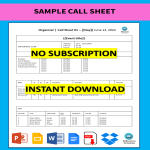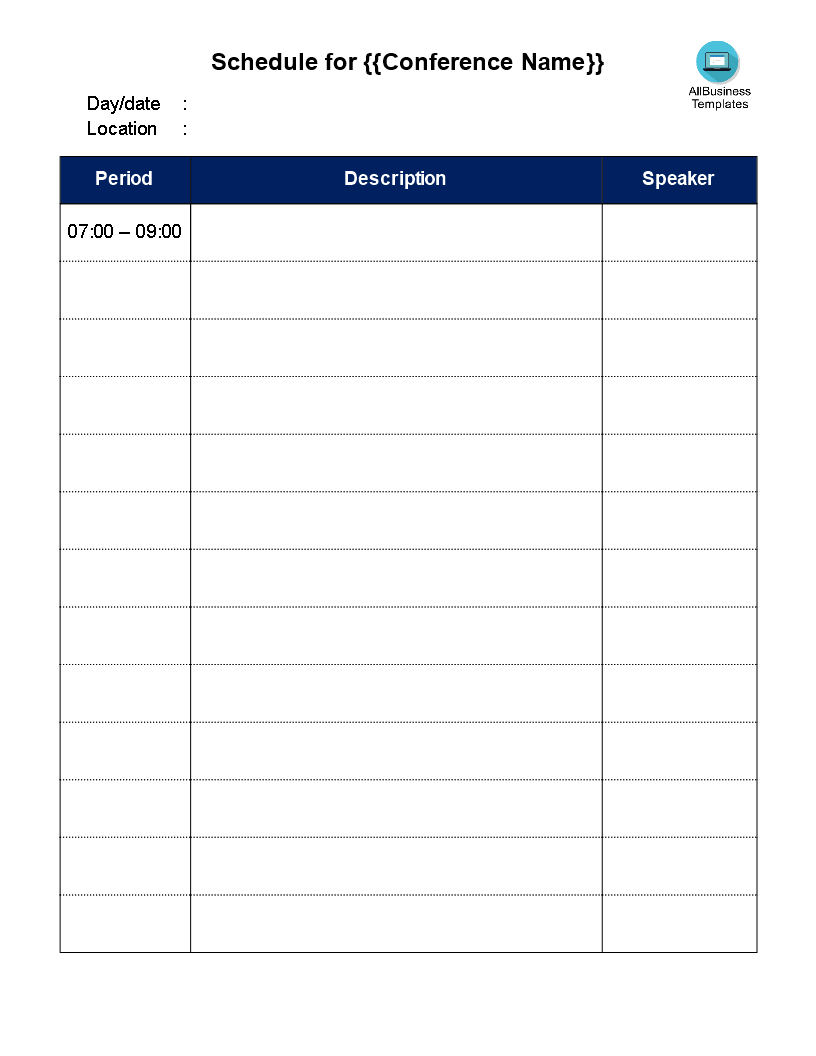Conference Schedule example
Save, fill-In The Blanks, Print, Done!

Download Conference Schedule example
Microsoft Word (.doc)Or select the format you want and we convert it for you for free:
- This Document Has Been Certified by a Professional
- 100% customizable
- This is a digital download (41 kB)
- Language: English
- We recommend downloading this file onto your computer.
Are you organizing a conference? How to create a Conference Schedule? Download this free Conference Schedule template now!
The way you communicate with the visitors of your conference is important. Using a conference schedule effectively can help you make the most of your time and ensure you attend the sessions and events that interest you the most.
Here are some steps to help you use a conference schedule efficiently:
- Review the schedule: Take some time to thoroughly review the conference schedule. Familiarize yourself with the sessions, workshops, keynotes, and any other events that will be taking place. Note the date, time, and location of each item.
- Identify your priorities: Determine which sessions and events are most important to you based on your interests, goals, and reasons for attending the conference. Highlight or mark these sessions in some way to easily identify them later.
- Plan your day: Once you know your priorities, create a personalized daily plan. Consider the timing and duration of each session, and make sure to include breaks, networking opportunities, and meals. Account for any overlapping sessions and decide which ones you'll attend.
- Create a schedule: You can create a physical or digital schedule to keep track of your planned activities. If the conference provides an official app or online platform, use it to access the schedule, build your own agenda, and receive notifications or updates.
- Be flexible: While it's essential to plan ahead, be prepared to adapt your schedule if necessary. Unexpected changes, cancellations, or rescheduling might occur. Stay informed about any updates or announcements from the conference organizers.
- Arrive early: Arriving early to sessions gives you a chance to secure a good seat and be prepared. Some popular sessions may have limited seating, so plan accordingly.
- Take notes: During the sessions, take notes on key points, insights, and any relevant information. This will help you remember the content later and provide valuable reference material.
- Engage with speakers and attendees: Conferences offer excellent opportunities for networking and learning from experts. Don't hesitate to ask questions, participate in discussions, and connect with speakers, presenters, and other attendees.
- Evaluate and reflect: After each session, take a few minutes to reflect on what you've learned. Consider how the information or insights can be applied to your work or personal development. This reflection will help you consolidate your knowledge and make the most of your conference experience.
- Remember, using a conference schedule is a way to organize your time and make informed choices, but it's also important to stay open to new opportunities and spontaneous interactions that can arise during the event. It’s important to communicate in a professional manner to your guests.
This Conference Schedule template will help you establish confidence with your conference guests.
Download this professional Conference Schedule template now! Using our business templates guarantees you will save time, cost and efforts and helps you to finish your work a bit quicker!
DISCLAIMER
Nothing on this site shall be considered legal advice and no attorney-client relationship is established.
Leave a Reply. If you have any questions or remarks, feel free to post them below.
Related templates
Latest templates
Latest topics
- Excel Templates
Where do I find templates for Excel? How do I create a template in Excel? Check these editable and printable Excel Templates and download them directly! - GDPR Compliance Templates
What do you need to become GDPR compliant? Are you looking for useful GDPR document templates to make you compliant? All these compliance documents will be available to download instantly... - Google Docs Templates
How to create documents in Google Docs? We provide Google Docs compatible template and these are the reasons why it's useful to work with Google Docs... - IT Security Standards Kit
What are IT Security Standards? Check out our collection of this newly updated IT Security Kit Standard templates, including policies, controls, processes, checklists, procedures and other documents. - Letter Format
How to format a letter? Here is a brief overview of common letter formats and templates in USA and UK and get inspirited immediately!
cheese


